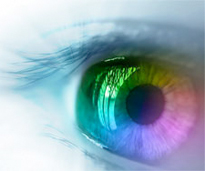Caring for your eyesight
Forty-percent of the input to our brain comes from our vision, so it's no surprise that caring for our vision has a direct impact on our lives and the quality of life we lead. Even if you have 20/20 vision taking step to be kind to your eyes can affect your long-term eye health.
Here are some ways to care for your eyes daily:
 Visit an optometrist for an annual eye exam. Learn about any existing problems you may have so you can adjust your lifestyle accordingly. Eye problems can creep in over time and you may not even be aware of them until they have reached a more serious stage. A good optometrist can diagnosis and detect early signs of eye problems or eye disease with a simple painless eye exam.
Visit an optometrist for an annual eye exam. Learn about any existing problems you may have so you can adjust your lifestyle accordingly. Eye problems can creep in over time and you may not even be aware of them until they have reached a more serious stage. A good optometrist can diagnosis and detect early signs of eye problems or eye disease with a simple painless eye exam.
Look away. If you are doing intense close-up work, reading or looking at a computer screen for hours, take time out to look away and focus on a distant object. This helps give your eyes a much-needed break and prevents over straining your eyes.
Used tea bags kept in the refrigerator can be a welcome relief for tired eyes due to working or extended periods outdoors in windy or harsh weather.
Drink plenty of water to help reduce puffiness around the eyes.
Read under proper light. Good strong light can help improve vision and reduce eyestrain.
Eat Healthy. Incorporate Vitamins A, C, and E on a daily basis; eat citrus fruits, green leafy veggies, tomatoes, spinach, poultry and dairy products. Take chopped carrots, cucumber and fresh fruits and munch in-between meals at the office.
Take Vitamins. If your not already taking them try adding daily vitamins such as B, B1 and B2, B3, B6, B 12 and folic acid, pantothenic acid, biotin and choline which can aid in different ways to keeping your eyes healthy.
Wear protective eyewear during biking or engaging in activities that might result in an eye injury. Visit your optician and discuss the right safety or sports glasses for you, many are available with prescription lenses.
Wear eyeglasses instead of contact lenses on windy days to avoid irritability.
Splash cool water on your eyes to help relax them and reduce puffiness.
Replace old make-up or foundation every few months to keep eye area clean and infection free. Always remove any makeup or sunscreen before going to sleep at night.
Remove contact lenses daily and clean. Some doctors recommend not wearing contacts for more then 10-12 hours a day.
Get Established
A professional eye care center often includes trained eye care specialist such as optometrist, ophthalmologist, and opticians. Many eye clinics today also include a professional onsite optical center so you can get the proper fit and prescription for eyeglasses or contacts before you leave the eye center.
Getting established with a professional eye center and eye doctors so that they can monitor your vision and changes over time giving you the advantage of early detection of eye problems you may not even notice yet. Avoid chain store or mall shops that often hire inexperienced doctors or staff and generally have a high turn over rate.
Trained experienced professionals can also talk to you about options such as Lasik surgery or laser surgery, removal of cataracts', contact lenses, age-related eye disease and a number of other eye related aliments.
Vision Changes If you experience vision changes even if there is no pain involved, don't wait until the annual exam. Call and make an appointment with your eye care center to have your vision checked. Halos around objects, flashes of light, dimmed vision and floaters may all be signs of a more serious problem.
For additional information or to schedule an Eye Examination, please contact us at (866) 611-7556.
Also Serving:
Sealy, TX - Bellville, TX - Columbus, TX - Katy, TX |
